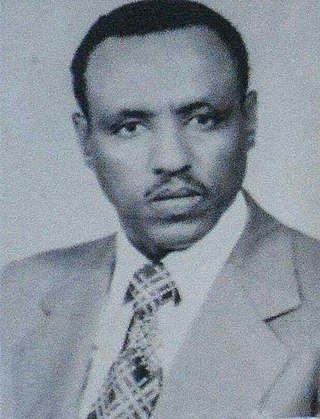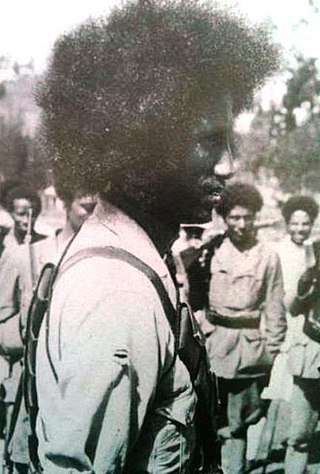
Lij Iyasu was the designated Emperor of Ethiopia from 1913 to 1916. His baptismal name was Kifle Yaqob. Ethiopian emperors traditionally chose their regnal name on the day they were crowned, and since he was never crowned, he is usually referred to as Lij Iyasu, "Lij" meaning child, especially one born of royal blood.

Tesfaye Gebre Kidan Geletu was an Ethiopian general who was the acting president of Ethiopia for one week in late May 1991.
Berhanu Bayeh is an Ethiopian former military officer and politician. He was the Foreign Minister of Ethiopia during the Derg regime from 1986 to 1989. Prior to that, he was chairman of the Derg's committee for legal affairs. Bayeh was a refugee resident of the Italian Embassy from May 1991 until December 2020, when he left the embassy.

The People's Democratic Republic of Ethiopia was a socialist state that existed in Ethiopia and present-day Eritrea from 1987 to 1991.

The Coalition for Unity and Democracy, commonly referred to by its English abbreviation CUD, or occasionally CDU, was a coalition of four existing political parties of Ethiopia which combined to compete for seats in the Ethiopian General Elections held on May 15, 2005, and around the end of that year, became a full-fledged political party. Its leader was Hailu Shawul and the political party was dissolved in 2007.
Hailu Shawul was an Ethiopian politician and civil engineer who was the leader of the Coalition for Unity and Democracy (CUD) during the 2005 Ethiopian general election. He was also the leader of All Ethiopian Unity Party from 1996 to 2013. He died on 6 October 2016, while receiving treatment at a hospital in Bangkok, Thailand.

Haddis Alemayehu was an Ethiopian novelist. His Amharic novel Love to the Grave is considered a classic of modern Ethiopian literature.

The nations of Ethiopia and Mexico established diplomatic relations in 1949. Both nations are members of the Group of 24 and the United Nations.

The Massacre of the Sixty, or Black Saturday, was an execution that took place in Addis Ababa, Ethiopia commissioned by the Derg government against 60 imprisoned former government officials at Kerchele Prison on the morning of 23 November 1974. The prison was commonly called Alem Bekagn – "I've had enough of this world".
Asfawossen Kassa was an army commander and a member of the royal family of the Ethiopian Empire.
Tesfaye Dinka Yadessa was an Ethiopian politician who was Minister of Finance (1983–1986), Minister of Foreign Affairs (1989–1991), and Prime Minister of Ethiopia. He was the head of the delegation of the Ethiopian Government during the London Conference of 1991 which aimed to end the Ethiopian Civil War.

Ethiopia–Japan relations are the international relations between Ethiopia and Japan. Before the Second Italo-Ethiopian War the Japanese worked towards economic goals with the Ethiopians in attempts to expand Japan's trade with the rest of the world.

The National Election Board of Ethiopia (NEBE) is an autonomous federal government agency which supervises the national elections of Ethiopia. The NEBE was established by Proclamation number 64/1992, and answers to the House of Peoples' Representatives. Melatework Hailu has been the current chairperson of NEBE since 19 December 2023.

Belay Zeleke was an Ethiopian military commander who led the Arbegnoch resistance movement in Gojjam against the Fascist Italians during the Italian occupation of Ethiopia from 1936 to 1941. He emerged as a brigand leader after his five-year struggle against Italian rule in Ethiopia.

The Massacre of the Sixty, or Black Saturday, was an execution that took place in Addis Ababa, Ethiopia commissioned by the Derg government against 60 imprisoned former government officials at Kerchele Prison on the morning of 23 November 1974. The prison was commonly called Alem Bekagn – "I've had enough of this world".

LijSeifu Mikael was an Ethiopian royal, member of the Solomonic dynasty from the House of Solomon that descended from the ancient Kingdom of Aksum, belonging to the branch of the aristocratic Amhara family from Ankober Shewa. He was the great-grandson of King Sahle Selassie of Shewa and his wife Queen Bezabish Dejene of Gojjam through his grandfather, Dejazmatch Mekuria Tesfaye of Gerim Gabriel, a first cousin of Emperor Menelik II of Ethiopia.

The Arbegnoch were Ethiopian anti-fascist World War II resistance fighters in Italian East Africa from 1936 until 1941 who fought against Fascist Italy's occupation of the Ethiopian Empire.

Jano Band is an Ethiopian rock band formed by its entrepreneurs Ermyas Amelga, Bill Laswell and former manager Addis Gessesse in 2011. It versatilely mixes progressive rock with Ethiopian music. The band includes two female back and lead vocalists, two lead male vocalists, and four musicians who play bass guitar, rhythm guitar, drum, and keyboards.
The 2019 Amhara Region coup d'état attempt was an attempted coup d'état against the Amhara Regional government on 22 June 2019, during which factions of the Amhara Region's Peace and Security Bureau assassinated the Amhara Regional President Ambachew Mekonnen. A bodyguard siding with the nationalist factions also assassinated General Se'are Mekonnen, the Chief of General Staff of the Ethiopian National Defense Force, as well as his aide Major General Gizae Aberra.
Getachew Ambaye is an Ethiopian politician who had served with various major governmental positions, notably, the Minister of Justice (2013–2016) and attorney general (2016–2018).













